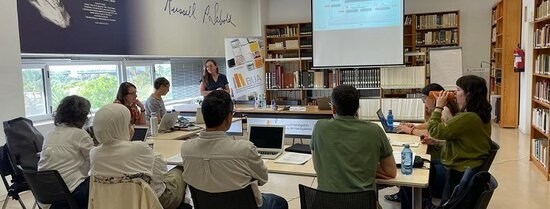The University of Alicante (UA) is hosting a meeting of the PACES consortium until Friday 24 October to engage in research–policy dialogue and advance work under the project Making migration and migration policy decisions amidst societal transformations (PACES).
Funded by Horizon Europe, PACES explores how societal transformations, individual circumstances and policy contexts shape decisions to migrate or to stay. The project aims to inform more effective and humane migration governance by examining both migration decision-making and migration policy processes side by side.
Insights from the meeting
The UA meeting brought together representatives from a dozen partner institutions to discuss preliminary findings and strengthen collaborative approaches. The UA team — Dr Sempere Souvannavong, Dr María Jesús Cabezón Fernández, Dr Zoulikha Benkaakaa and Dr Mariví Pérez Mateo — shared updates from their extensive fieldwork. To date, they have conducted around eighty in-depth interviews in Algeria and thirty with Nigerian migrants in Spain.
Their research shows that development processes at national and local levels bring both progress and new challenges. While infrastructure, education and healthcare services improve, these advances are not always accompanied by better governance or greater security. In many cases, job insecurity and rising living costs undermine people’s sense of stability.
‘These ambiguous experiences do not always lead directly to migration,’ explains Dr Sempere Souvannavong, ‘but they do shape the idea of leaving as a possible future path.’ Participants in the study often describe mixed feelings of gratitude and frustration — appreciation for new opportunities, but a sense of exclusion when unable to fully contribute to their host societies.
Looking ahead
Running from 2023 to 2026, PACES brings together partners from Europe, Africa and the US to bridge the gap between research and policy. Through interviews, surveys and participatory dialogues with migrants, civil society and employers, the consortium seeks to co-create evidence that can help shape migration policies grounded in lived experience rather than simplified assumptions.
- Researcher
- More information
Information from this article was provided by the University of Alicante's summary.
- Related content

